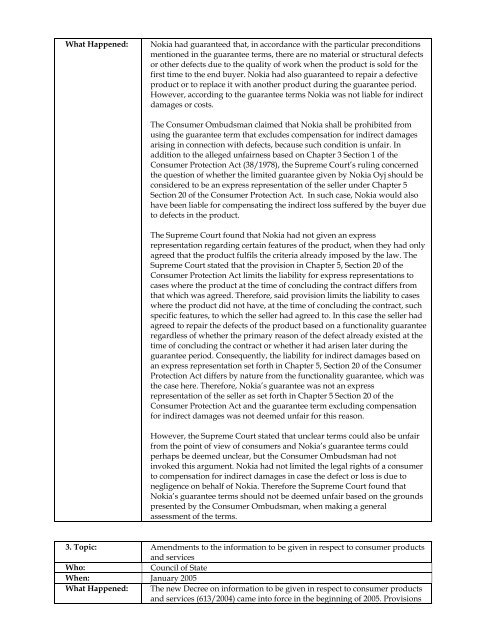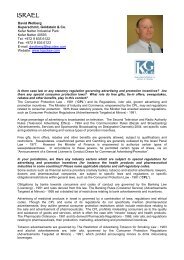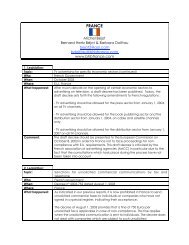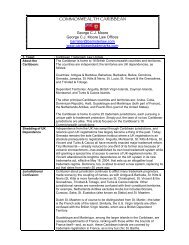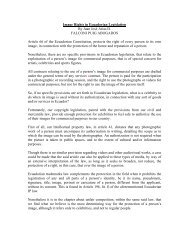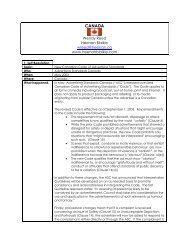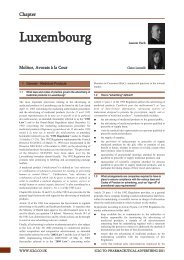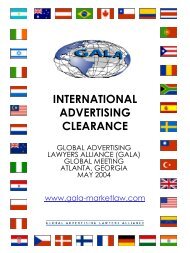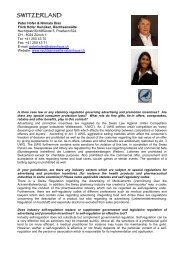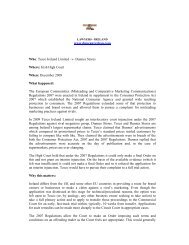list of contributors - GALA
list of contributors - GALA
list of contributors - GALA
Create successful ePaper yourself
Turn your PDF publications into a flip-book with our unique Google optimized e-Paper software.
What Happened: Nokia had guaranteed that, in accordance with the particular preconditions<br />
mentioned in the guarantee terms, there are no material or structural defects<br />
or other defects due to the quality <strong>of</strong> work when the product is sold for the<br />
first time to the end buyer. Nokia had also guaranteed to repair a defective<br />
product or to replace it with another product during the guarantee period.<br />
However, according to the guarantee terms Nokia was not liable for indirect<br />
damages or costs.<br />
The Consumer Ombudsman claimed that Nokia shall be prohibited from<br />
using the guarantee term that excludes compensation for indirect damages<br />
arising in connection with defects, because such condition is unfair. In<br />
addition to the alleged unfairness based on Chapter 3 Section 1 <strong>of</strong> the<br />
Consumer Protection Act (38/1978), the Supreme Court’s ruling concerned<br />
the question <strong>of</strong> whether the limited guarantee given by Nokia Oyj should be<br />
considered to be an express representation <strong>of</strong> the seller under Chapter 5<br />
Section 20 <strong>of</strong> the Consumer Protection Act. In such case, Nokia would also<br />
have been liable for compensating the indirect loss suffered by the buyer due<br />
to defects in the product.<br />
The Supreme Court found that Nokia had not given an express<br />
representation regarding certain features <strong>of</strong> the product, when they had only<br />
agreed that the product fulfils the criteria already imposed by the law. The<br />
Supreme Court stated that the provision in Chapter 5, Section 20 <strong>of</strong> the<br />
Consumer Protection Act limits the liability for express representations to<br />
cases where the product at the time <strong>of</strong> concluding the contract differs from<br />
that which was agreed. Therefore, said provision limits the liability to cases<br />
where the product did not have, at the time <strong>of</strong> concluding the contract, such<br />
specific features, to which the seller had agreed to. In this case the seller had<br />
agreed to repair the defects <strong>of</strong> the product based on a functionality guarantee<br />
regardless <strong>of</strong> whether the primary reason <strong>of</strong> the defect already existed at the<br />
time <strong>of</strong> concluding the contract or whether it had arisen later during the<br />
guarantee period. Consequently, the liability for indirect damages based on<br />
an express representation set forth in Chapter 5, Section 20 <strong>of</strong> the Consumer<br />
Protection Act differs by nature from the functionality guarantee, which was<br />
the case here. Therefore, Nokia’s guarantee was not an express<br />
representation <strong>of</strong> the seller as set forth in Chapter 5 Section 20 <strong>of</strong> the<br />
Consumer Protection Act and the guarantee term excluding compensation<br />
for indirect damages was not deemed unfair for this reason.<br />
However, the Supreme Court stated that unclear terms could also be unfair<br />
from the point <strong>of</strong> view <strong>of</strong> consumers and Nokia’s guarantee terms could<br />
perhaps be deemed unclear, but the Consumer Ombudsman had not<br />
invoked this argument. Nokia had not limited the legal rights <strong>of</strong> a consumer<br />
to compensation for indirect damages in case the defect or loss is due to<br />
negligence on behalf <strong>of</strong> Nokia. Therefore the Supreme Court found that<br />
Nokia’s guarantee terms should not be deemed unfair based on the grounds<br />
presented by the Consumer Ombudsman, when making a general<br />
assessment <strong>of</strong> the terms.<br />
3. Topic: Amendments to the information to be given in respect to consumer products<br />
and services<br />
Who: Council <strong>of</strong> State<br />
When: January 2005<br />
What Happened: The new Decree on information to be given in respect to consumer products<br />
and services (613/2004) came into force in the beginning <strong>of</strong> 2005. Provisions


